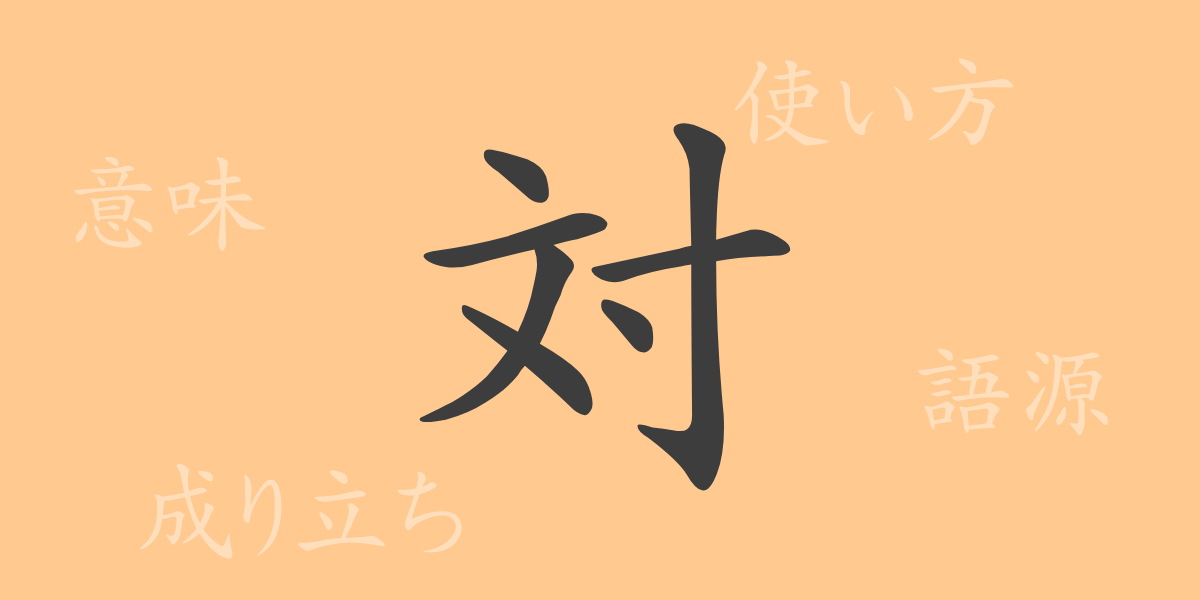The depth of Japanese written culture is vividly expressed through Kanji, each with its own diverse meanings and forms. This article focuses on the Kanji “(対)” (tai/tsui), exploring its origins, contemporary usage, and more. We will delve into the development, meaning, and application of “(対)”, as well as phrases and idioms that incorporate this character, providing insights into the complex backdrop of a single Kanji and enhancing understanding of the Japanese language.
Origins of “(対)” (tai/tsui)
The Kanji “(対)” originated in ancient China. Initially symbolizing ‘covering a treasure dish’, it represented objects facing each other. Over time, it came to denote opposing items, pairs, and corresponding entities, eventually reaching Japan. In Japan, “(対)” is crucial for denoting comparisons, dialogues, and relationships, frequently used in contexts that illustrate mutual interactions.
Meaning and Usage of “(対)” (tai/tsui)
“(対)” encompasses meanings such as ‘facing each other’, ‘corresponding’, and ‘in pairs’. It is used in terms such as equality (対等), comparison (対比), and conversation (対話), indicating equal relationships, contrasting differences, and exchanging words, respectively. These terms are commonly employed in everyday life, in contexts of interpersonal relations, comparisons of matters, and communication.
Readings, Stroke Count, and Radical of “(対)” (tai/tsui)
Let’s explore the readings, stroke count, and radical of the Kanji “(対)”.
- Readings: On’yomi “タイ” (tai), “ツイ” (tsui), Kun’yomi “あいて” (aite), “こたえる” (kotaeru), “そろい” (soroi), “つれあい” (tsureai).
- Stroke Count: “(対)” has 7 strokes.
- Radical: The radical is 宀 (うかんむり), which represents a roof and is used in Kanji related to shelter or cover.
Phrases, Proverbs, and Idioms Using “(対)” (tai/tsui) and Their Meanings
There are numerous phrases and idioms involving “(対)”, each with unique meanings:
- 対照的 (たいしょうてき) – Describes a situation where two things are distinctly different.
- 対応策 (たいおうさく) – Refers to measures or strategies to address a problem.
- 対面交流 (たいめんこうりゅう) – Direct interaction where opinions are exchanged face-to-face.
- 対等 (たいとう) – A situation where individuals or entities are equal in status or value.
- 対立 (たいりつ) – A condition of opposition or conflict between differing opinions or positions.
These expressions utilize the fundamental meanings of ‘facing’ and ‘responding’ inherent in “(対)”, adapting to various situations.
Summary on “(対)” (tai/tsui)
The Kanji “(対)” symbolizes the act of facing or confronting something, as indicated by its form and meanings. Its use in Japanese spans a broad spectrum, conveying the significance of relationships, comparisons, and dialogue. Understanding this deeply rooted character in Japanese culture and language enables richer expression and broadens communicative possibilities, reflecting the complex nature of “(対)”.

























